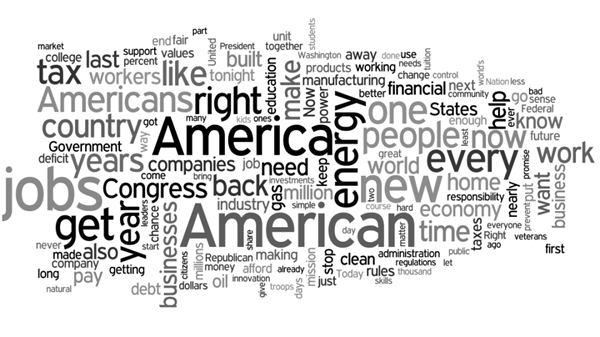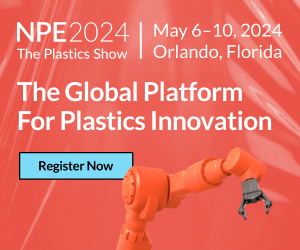Manufacturing’s State of the Union Was…Mixed
Whether you feel it represents the basest form of political theater or the heights of patriotic rhetoric, the State of the Union Address is with us for good (barring an amendment to the Constitution).
Article II, Section 3, Clause 1, U.S. Constitution:
“[The President] shall from time to time give to the Congress Information of the State of the Union, and recommend to their Consideration such measures as he shall judge necessary and expedient.”
Last week, President Barack Obama updated the union’s state and gave a joint session of Congress a list of measures he judged “necessary and expedient” for the sixth time going back to 2010 [his first address to a joint session of Congress roughly month after his election in 2009, wasn’t technically a SOTU].
The support the 44th president has in the plastics industry specifically and manufacturing in general is grudging at best, but I’ve spoken with several people on the industry’s advocacy side who acknowledge Obama has in general been attentive to if not supportive of manufacturing.
Two weeks ago, my colleague Lilli Manolis Sherman wrote about the visit Obama and Vice President Joe Biden paid to Techmer PM, where he announced a $250-million advanced composite innovation hub. Reshoring advocate Harry Moser was a guest of the White House in 2012, participating in its Insourcing American Jobs Forum.

That same year, Obama’s SOTU address directly referenced “manufacturing” 12 times (can you spot “manufacturing” in the word cloud?). In 2015, however, direct mentions of manufacturing were down, as were tangential references, but they were still present.
Economic recovery: We believed we could reverse the tide of outsourcing, and draw new jobs to our shores. And over the past five years, our businesses have created more than 11 million new jobs.
Skills gap: Thanks to Vice President Biden's great work to update our job training system, we're connecting community colleges with local employers to train workers to fill high-paying jobs like coding, and nursing, and robotics.
Infrastructure: Since 2010, America has put more people back to work than Europe, Japan, and all advanced economies combined. Our manufacturers have added almost 800,000 new jobs. Some of our bedrock sectors, like our auto industry, are booming.
Trade: More than half of manufacturing executives have said they're actively looking at bringing jobs back from China.
Industry Responds
Many in manufacturing watched the address, sharing their thoughts in real time via Twitter or issuing responses afterwards. Bill Carteaux, president and CEO of SPI, noted the need for the president to deliver on a promised “reach across the aisle” on areas that impact plastics. “Many of our industry’s most important issues are ripe for bipartisan solutions in 2015,” Carteaux stated, specifically citing:
Continued access to natural resources that provide not just the power to run our facilities, but also constitute our primary supply of raw materials.
Long overdue update to the Toxic Substances Control Act (TSCA) to ensure that chemical regulation takes a risk-based approach going forward
Modernization of America’s antiquated tax code
Action on multi-lateral trade agreements that break down export barriers
Carteaux said that SPI was “troubled” by some of the tax policy proposals outlined by Obama, “particularly those that could deter investors from risking capital, and others that would negatively impact family-owned plastics industry businesses.”
Carteaux also noted that SPI’s advocacy team was on Capitol Hill when 2015’s Congressional class, including 13 new senators and 58 new members of the House, took the oath of office, adding that at least on that day “the sense of urgency in tackling the nation’s priorities was tangible.”
The headline at the National Association of Manufacturer’s (NAM) following the address echoed that mixed reaction:
President’s Call for Pro-Trade Policies Promising Sign for Manufacturers
However, Punitive Tax Plan Sends Wrong Signal
NAM President and CEO Jay Timmons, like Obama, touched on the resurgent economy, however he gave direct credit for its renewed vitality to manufacturing, before noting the president’s “mixed messages” for industry.
“Manufacturers powered the American resurgence the President hailed tonight. Manufacturing in the United States is back. But instead of firmly pressing the accelerator to strengthen the dreamers, makers and builders of America, the President offered the country mixed messages. While some are positive, others threaten to put the brakes on our economic revival.”
In terms of NAM’s “positives” in the address, Timmons cited:
The Trade Promotion Authority (TPA)
Addressing workforce issues and skills gap
Ensuring long-term solutions to infrastructure
Like SPI, however, NAM took issue with the tax proposals laid out by Obama.
“Unfortunately, the tax plan the President introduced tonight sends the wrong signal. We’re just beginning to come out of the depths of the recession. We need more policies that encourage investment, entrepreneurship and success, not less.”
What did you think? Are trade deals, infrastructure and the skills gap areas where Obama and Republicans can come together for the betterment of manufacturing, or were those fleeting glimmers of bipartisan compromise overshadowed by D.O.A. tax proposals?
Read Next
Lead the Conversation, Change the Conversation
Coverage of single-use plastics can be both misleading and demoralizing. Here are 10 tips for changing the perception of the plastics industry at your company and in your community.
Read MorePeople 4.0 – How to Get Buy-In from Your Staff for Industry 4.0 Systems
Implementing a production monitoring system as the foundation of a ‘smart factory’ is about integrating people with new technology as much as it is about integrating machines and computers. Here are tips from a company that has gone through the process.
Read MoreFor PLASTICS' CEO Seaholm, NPE to Shine Light on Sustainability Successes
With advocacy, communication and sustainability as three main pillars, Seaholm leads a trade association to NPE that ‘is more active today than we have ever been.’
Read More














 (2).jpg;maxWidth=300;quality=90)







